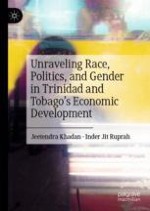2024 | OriginalPaper | Buchkapitel
12. Social Development: Who We Are? The Value and Happiness
verfasst von : Jeetendra Khadan, Inder Jit Ruprah
Erschienen in: Unraveling Race, Politics, and Gender in Trinidad and Tobago’s Economic Development
Verlag: Springer Nature Switzerland
Aktivieren Sie unsere intelligente Suche, um passende Fachinhalte oder Patente zu finden.
Wählen Sie Textabschnitte aus um mit Künstlicher Intelligenz passenden Patente zu finden. powered by
Markieren Sie Textabschnitte, um KI-gestützt weitere passende Inhalte zu finden. powered by
